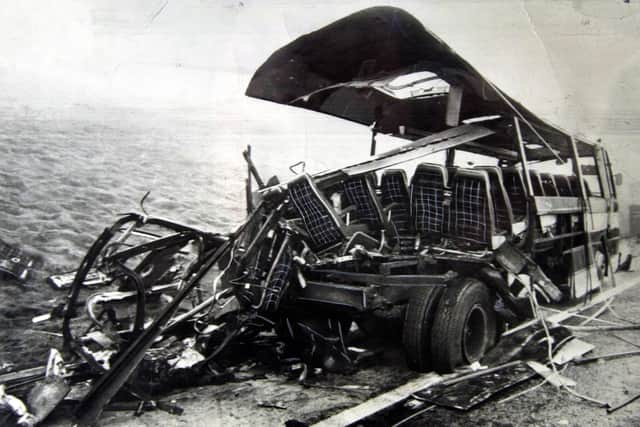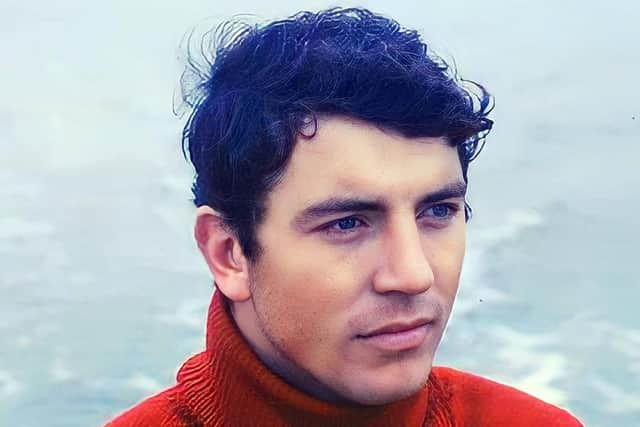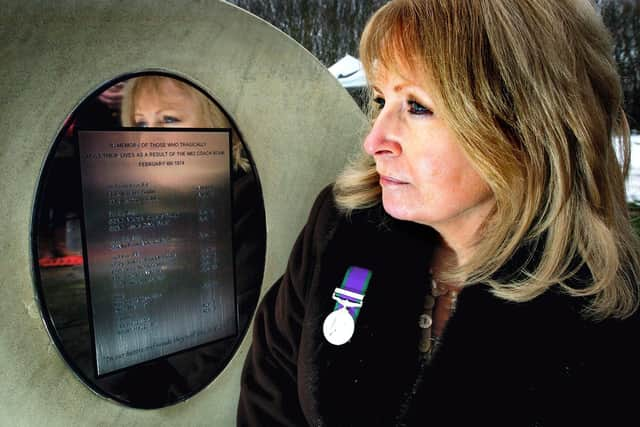M62 coach bombing: 50 years since Provisional IRA attack killed 12 people on Yorkshire motorway
Terence Griffin was just 24. He was a soldier in Yorkshire and had a full life ahead of him. With just 18 months left to serve, he had plans to set up a boat-building company.
But 50 years ago almost to the day, the Provisional IRA shattered those dreams with a coach bomb on the M62 near Hartshead Moor service station.
Advertisement
Hide AdAdvertisement
Hide AdTerence was one of 12 killed. Nine soldiers lost their lives plus a soldier’s wife and two children. It was one of the first major acts of terror to hit England and still 50 years on there are people with grim memories of February 4 1974.


Terence’s younger sister Mo Norton – or Maureen – was just 20 at the time. She said: “These weren’t soldiers with guns. They were young lads and their families on the way back to Catterick.
“Terence was a wonderful young man. I’m biased of course but everyone said so. He was gregarious, full of fun, thoughtful and smart. He was the best older brother.
“He joined the Army at 15 which you could do in those days if you had parental permission. Our dad Heber felt enormous responsibility – guilt, if you like – because he had signed the form.
Advertisement
Hide AdAdvertisement
Hide Ad“It was a terrible shock to all the family but especially my dad. He wouldn’t eat. He died two years later. So in effect the Provisional IRA killed two members of my family. And for what? For nothing.


“The picture of Terence is the last photo that was taken of him. It was a few weeks before he died when he went to Norfolk for a holiday with his friends.
“He loved being in the Army. He had served in Northern Ireland and in Germany. We were worried when he was in Northern Ireland but he told us how good the Irish people were.
“We were a military family. My dad had served in the Middle East, Yemen and Germany and we had gone with him. Then we settled in Bolton and I eventually moved to Wigan.
Advertisement
Hide AdAdvertisement
Hide Ad“Terence had never been sure whether to join the RAF, the Royal Navy or the Army. He had weekends away with each to see which he preferred and he eventually chose the Royal Artillery.”


Now the 50th anniversary is coming up, Mo says she will make one of her regular visits to Hartshead Moor services where there is a memorial plaque. It used to be inside the building next to a noisy amusement arcade but Mo and others successfully campaigned for it to be moved outside to a quiet spot. An oak tree was also planted there.
Back in 1974 some of the survivors sought refuge at Hartshead Moor. A bomb planted in the luggage compartment had ripped through the coach on the motorway near the services, reducing the vehicle to a twisted heap of metal.
Mo’s Dad first heard a radio newsflash about a coach bomb not long after it had exploded just after midnight. But it took until the following evening before the family heard the full tragic news.
Advertisement
Hide AdAdvertisement
Hide Ad“There was no counselling in those days,” she said. “Now my Dad would be diagnosed with depression and there would be treatment but there was nothing back then.
“My mother was the strong one. She kept the family together but my Dad couldn’t cope with the guilt.”
The coach had been one of five which had set off from Manchester to take the men, their wives and children back to army bases in North Yorkshire and Darlington following weekend leave. Usually they would have caught the train, but ongoing industrial action on the railways had once again disrupted their plans and that Sunday night they had no choice but to go by road.
At 12.20am what onboard chatter there had been was silenced by the bomb.
Advertisement
Hide AdAdvertisement
Hide AdThe driver, ignoring the blood streaming down his face, managed to steer onto the hard shoulder between Chain Bar and Gildersome. Opening his door, he stepped out into a bitter night, grabbing a torch to assess the damage. It wasn’t long before he found the first of the bodies.
The eldest victim was just 28. The death toll also included a family of four. Corporal Clifford Houghton and his wife Linda had been sitting at the back of the bus, their two children aged five and two. All were killed instantly.
“The terrible truth that a terrorist bomb had exploded in Yorkshire had not occurred to me as I approached the flashing blue lights on the M62,” wrote Neil Mackwood in the following day’s Yorkshire Post. “The skeleton of the 49-seater coach, laid bare in the stark glare of arc lamps, was the grim reality.
"Behind it stretching for more than 200 yards was a trail of destruction. Wreckage littered the high embankment and more debris had been blasted across the motorway. All the evidence that the coach had been blown apart.
Advertisement
Hide AdAdvertisement
Hide Ad“I counted seven bodies, some covered with blankets hastily thrown over them before the ambulancemen carried them away. A policeman, filled with grief by what he saw, said: ‘You would never have thought it, something like this happening not 10 miles from Leeds’.”
There were stories of lucky survivors, like 18-year-old Signalman William Yeates. He’d spent the last few hours of his leave playing bingo with his family. The session had overrun and when he finally got to the coach his usual seat at the back was already taken forcing him to sit at the front away from the heart and heat of the explosion.
Pressure soon mounted on Scotland Yard and West Yorkshire Police’s head of CID, George Oldfield. The Government and the public wanted results and fast. They got them.
Just 10 days after the explosion, the suspicions of a police dog handler from Liverpool were aroused when he saw a young woman peering at him from around a shop doorway. A brief conversation followed and on little more than a hunch he took her in for questioning.
Advertisement
Hide AdAdvertisement
Hide AdBy that November, 25-year-old Judith Ward was in the dock of Wakefield Crown Court facing 12 murder charges and accused of another two bombings. The trial was a media circus.
While the prosecution told the jury Ward was a gunrunner, bombmaker and vital cog in the IRA machinery, her testimony was often garbled and incoherent. Even her defence barrister admitted she may well have been “a Walter Mitty character desperate for a place in IRA folklore”, but the prosecution juggernaut kept rolling.
It took the jury five hours and 40 minutes to return a verdict. Ward was found guilty on all counts and sentenced to 30 years in prison with no recommended minimum term. It was not, however, the end of the story. For all those who had been touched by the M62 explosion there was more pain to come.
Ward’s convictions were quashed in 1992.
So, will there be more arrests or convictions? Mo is doubtful. “I would be very surprised,” she said. “There is no campaign for justice. We don’t think there will ever be justice.”
---
Advertisement
Hide AdAdvertisement
Hide AdMo Norton says she will be going to Hartshead Moor service station on Saturday February 3 in order to be there for the 10am gathering the following morning.
She is looking forward to meeting a contingent from the Wave Trauma Centre.
The CEO Sandra Peake MBE, Grainne Mckenna, trauma education officer and about six people who have lost family members due to Northern Irish terrorism who want to support the 50th anniversary.
“They have done tremendous work with victims and continue to do so,” said Mo.
Advertisement
Hide AdAdvertisement
Hide Ad“I have been involved with them since 2015 and go over to Belfast several times a year to support the charity.
“I think it is important that we keep the memory of the victims alive.
“The families remember of course, but I’m not sure the general public do.
“But these people deserve to be remembered. It’s important.”
